Reverse sneezing in dogs (paroxysmal respiration) can look quite alarming but thankfully is often harmless. Integrative veterinarian Dr. Julie Buzby explains the causes of reverse sneezing, how to stop an episode, and when you need to go to the vet.
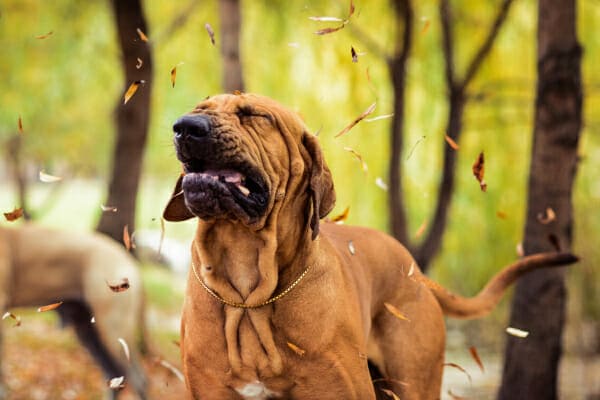
Last spring, my office received an alarming call about a dog who was gasping for air. We advised that the dog needed to be seen immediately. About ten minutes later, Mr. Nelson came rushing in with his 5-year-old Maltese, Muffin. Muffin, however, seemed oddly unconcerned after her near death episode. She trotted happily into the clinic and greeted us with her typical exuberance.
Muffin’s worried dad explained that Muffin had gone on her usual routine walk and was sniffing one of her favorite spots in the neighbor’s flower bed when she stopped suddenly and started gasping with her head and neck outstretched. The episode had lasted about a minute, but it seemed like an eternity for her dad.
Muffin’s physical exam showed that she was a healthy, happy dog. Her gums were pink and moist, which meant she was getting enough oxygen, and her other vital signs were normal too. Her lungs sounded healthy and I didn’t hear a heart murmur or any abnormal heart rhythms on her exam. When I palpated her trachea (i.e. windpipe), Muffin didn’t cough as would be expected if she had a collapsed trachea.
I told my client I was pretty confident this was a case of reverse sneezing in dogs. But I recommended X-rays to be on the safe side.
What is reverse sneezing in dogs?
Everyone is familiar with sneezing due to a cold, allergies, or just getting something as simple as dust or pollen up your nose. During a regular sneeze, your lungs force air out through the nose to dislodge whatever is causing the irritation.
A reverse sneeze is a similar concept but in reverse. In this situation, the irritation is commonly in the back of the nasal passages or the back of the dog’s throat (i.e. the nasopharynx). During a reverse sneeze (i.e. paroxysmal respiration), the body pulls air through the nose and toward the lungs as the dog inhales forcefully. As the dog rapidly draws air over the structures in the nose and throat, this creates the reverse sneezing sound.
Aimee Johnson, DVM, graciously shared this video which shows classic reverse sneezing….
What does reverse sneezing in a dog look like?
A reverse sneeze has a characteristic appearance. The dog often stands still with his or her neck outstretched and head tilted backward as he or she forcefully inhales through the nose. This creates a loud snorting sound. The dog may also flare the nostrils or pull back the lips slightly.
The overall appearance of the episode can be quite dramatic. It is no wonder that dog parents may think their beloved dog is choking, having trouble breathing, or even having a seizure in dogs.
Every dog’s reverse sneeze is a little unique. This video shows Mailey, a Cocker Spaniel mixed breed dog, reverse sneezing. Video credit: Dr. Jennifer Barczak
What causes reverse sneezing in dogs?
An episode of reverse sneezing can be triggered by anything that causes irritation in the back of the throat. Some common causes of reverse sneezing in dogs are:
- Pollen, dust, cigarette smoke, or other irritants
- Secretions or mucous secondary to allergies, cold weather, infection, etc.
- Nasal mites
- Fungal infections
- Foreign objects such as grass awns (e.g. foxtails in dogs)
- Nasal tumors in dogs or other tumors in the back of the throat
- Irritation of the back of the throat due to acid reflux in dogs
- Excitement or pulling on the leash
- Eating or drinking rapidly
And sometimes the reverse sneezing is idiopathic. In other words, no one can figure out what triggers it.
Is reverse sneezing dangerous?
The good news is that a reverse sneezing episode usually only lasts a couple of seconds to a few minutes and is harmless. In most cases, treatment is not needed. However, if a dog’s reverse sneezing becomes repetitive or disruptive, or the dog suddenly starts reverse sneezing more often, he or she may need treatment.
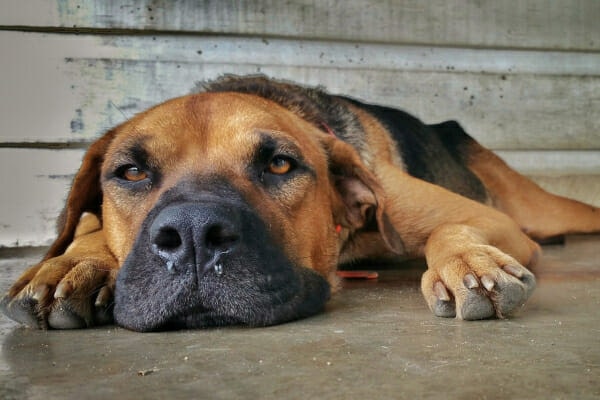
A note about sudden onset reverse sneezing in dogs
Occasional episodes of reverse sneezing in dogs can be normal. But if it seems like your dog is suddenly having repeated episodes of reverse sneezing over a period of hours or a few days, it is a good idea to make a vet appointment. This is especially the case if your dog is also pawing at his or her nose, doing “regular” sneezing too, or has nasal discharge.
It is possible that the sudden onset of reverse sneezing is just due to a flare-up of seasonal allergies. But it also could indicate that something, such as a foxtail, is stuck in your dog’s nose or back of the throat. And the sooner you get it out, the better.
Can reverse sneezing look like other problems?
It is important to know, though, that while reverse sneezing in dogs is generally not dangerous, it can sometimes be easy to confuse it with symptoms of more worrisome (or even life-threatening) respiratory conditions.
Collapsed trachea vs. reverse sneezing in dogs
For example, sometimes when a dog is reverse sneezing, it may almost sound like they are doing a dry cough, such as you would hear with collapsed trachea in dogs. However, with a reverse sneeze, the dog is pulling air in through the nose. And with a collapsed trachea, the cough has a goose-honking sound, and the dog is expelling air out of the mouth.
Also, dogs who are just reverse sneezing should not have any trouble breathing or start to turn blue. But sometimes collapsing trachea can be severe enough for a dog to go into respiratory distress.
Reverse sneezing in dogs and congestive heart failure
Another condition that can cause dogs to cough (which may sound a bit like a reverse sneeze) is congestive heart failure (CHF) in dogs. A true congestive heart failure cough is usually moist-sounding due to fluid in the lungs. However, dogs with heart disease may also have a dry cough due to a large heart pressing in the trachea where it splits into left and right bronchi.
It is possible that you might notice reverse sneezing in dogs with congestive heart failure. But this doesn’t necessarily mean the reverse sneezing is caused by the CHF. Reverse sneezing can, however, make it harder for a dog with congestive heart failure to get enough oxygen. Or it may cause the dog to have a fainting spell.
Signs of a more concerning problem
Since reverse sneezing in dogs can sometimes be confused with other conditions, keep an eye out for more concerning symptoms such as:
- Increased abdominal effort while breathing
- A dog coughing and gagging (a dry, goose-honking cough or a more moist sounding cough)
- A bluish or purplish tint to the gums
- A dog who is breathing fast
- Gasping or struggling to breathe
- Exercise intolerance (e.g. the dog tires fast or won’t exercise anymore)
- Sudden collapse
All of these signs can signal a more serious medical issue that requires immediate veterinary attention. If you aren’t sure when your dog needs to go to the emergency vet, it is always best to call the vet or bring your dog in for an emergency vet visit.
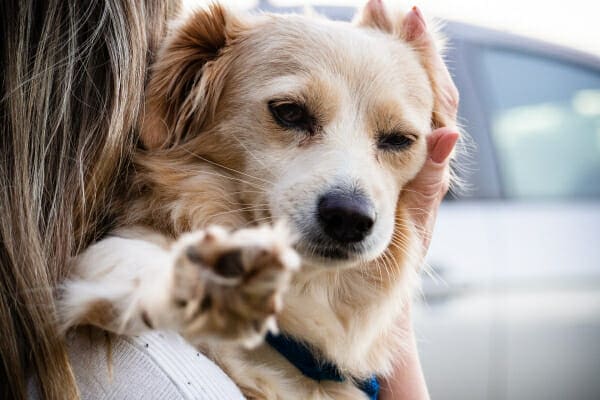
Which dogs are at a higher risk of reverse sneezing?
Any dog could potentially have reverse sneezes, but some dogs tend to be more at risk than others. Small breed dogs have small throats which make them more prone to reverse sneezing. Also dogs like Pugs and Bulldogs, or other brachycephalic dogs (i.e. those with short noses) tend to have an elongated soft palate. This can make them more likely to reverse sneeze.
How is reverse sneezing diagnosed?
Because of its characteristic appearance, reverse sneezing in dogs is often diagnosed based on the description and lack of other symptoms. If the dog parents happen to catch a video of the episode, that makes diagnosis even easier. However, in some cases the vet may recommend additional diagnostics to rule out other medical conditions.
X-rays
The veterinarian may use X-rays to evaluate the size and shape of the heart to look for evidence of heart disease in dogs. Additionally, X-rays can help the vet detect issues with the health of the lungs such as tumors, infections (e.g. pneumonia in dogs), or chronic bronchitis in dogs.
Narrowing of the trachea, which would be consistent with tracheal collapse, can also be detected on X-rays. In some cases, X-rays of the head and nasal passages can help identify a tumor, but there are more sensitive tests such as CT and rhinoscopy.
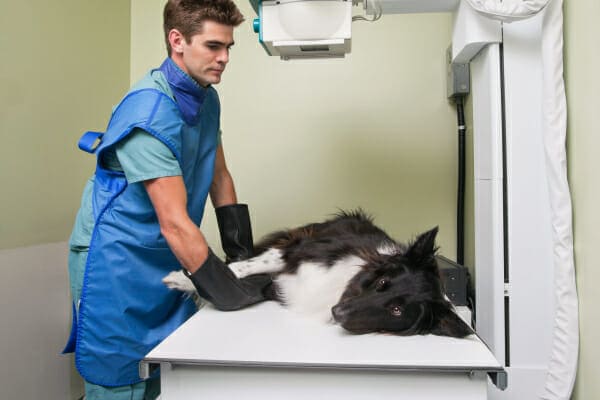
Computed tomography (CT)
If the veterinarian suspects an issue with the nasal passages or back of the throat, he or she may also recommend a CT. This type of imaging takes pictures that are thick “slices” through the tissue. Thus, CT allows a more thorough 3D evaluation of a solid structure like the skull. CT would allow visualization of tumors, foreign bodies, or other issues that may not show up well on X-rays.
Rhinoscopy
This test involves sticking a small camera into the nostrils of the dog under anesthesia. The benefit of rhinoscopy is that it allows the doctor to see into the nasal passages. The vet can also insert small tools into the tube holding the camera, which allows for biopsies of tumors.
Rhinoscopy is also a good method for removal of foreign objects, as demonstrated by a 2020 article in The Journal of Small Animal Practice. Interestingly, in that study, researchers also observed that 90.5% of the nasal foreign bodies were grass awns. The remainder were mineral or fabric.
What is the treatment for reverse sneezing in dogs?
In most cases, reverse sneezing resolves on its own and does not require treatment. However, in some cases your veterinarian may prescribe certain medications or therapies.
Benadryl for reverse sneezing in dogs
If the vet suspects that allergies or sensitivity to environmental irritants could be the cause of the reverse sneezing, he or she may suggest an antihistamine such as Benadryl for dogs. Routinely taking Benadryl may help decrease some of the irritation in the throat from the allergens themselves, or due to allergy-related mucus secretions in the back of the throat.
Safety note: Ensure that you purchase plain Benadryl (diphenhydramine) that is free from any additional medications such as decongestants or cough suppressants. These combination products can be dangerous for dogs. Additionally, if you are using Benadryl liquid, always check the label to ensure it is free from birch sugar (xylitol), which is toxic for dogs.
Alternatively, if Benadryl doesn’t seem to be working well for your dog, your vet may suggest one of the many other allergy medicines for dogs.
Steroids
In more severe cases of reverse sneezing in dogs, the vet may recommend oral or inhaled steroids such as prednisone for dogs. These medications do have the potential for more side effects. But they are a powerful way to reduce inflammation in the nose and throat.
Nasal flush
Occasionally, the vet may suggest rinsing out the nasal passages with saline for dogs experiencing reverse sneezing. This can be a way to remove irritants or foreign bodies in some cases. However, other, more stubborn foreign bodies may require rhinoscopy for removal.
Additional problem-specific treatments
Any other treatment would vary depending on the cause of the reverse sneezing.
- Nasal mites (suspected or confirmed)—The vet will typically prescribe an anti-parasitic agent.
- Foreign body—Removal via rhinoscopy is often the treatment of choice, but nasal flushing works sometimes.
- Nasal tumors—Treatment generally requires a consultation with a veterinary oncologist.
- Elongated soft palate—In some situations, the vet may recommend surgically shortening the soft palate to a more normal length.
Are there home remedies for reverse sneezing in dogs?
Understandably, pet parents may want to try some home remedies for reverse sneezing, especially if it is infrequent. As mentioned earlier, Benadryl (diphenhydramine) does sometimes help decrease the frequency of reverse sneezing and is available over the counter. Just ensure it is free from xylitol and other medications. And consult with your vet before giving your dog Benadryl.
Additionally, if you figure out what is causing your dog’s reverse sneezing, sometimes you can avoid the triggers. For example, you may be able to keep your dog away from cigarette smoke, air fresheners, or fresh-cut grass. But it isn’t possible to avoid all allergens or causes of reverse sneezing.
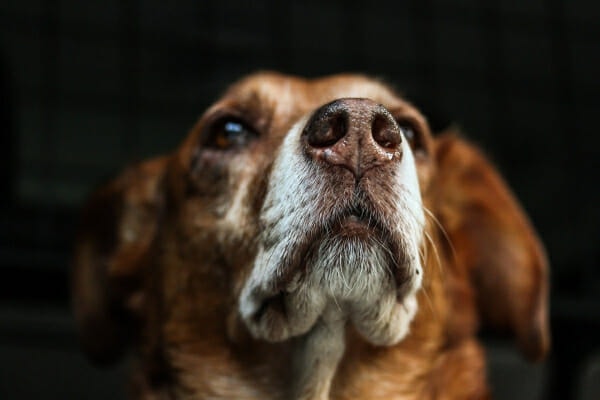
How can you stop reverse sneezing in dogs?
I understand that even though reverse sneezing is usually short-lived, it can be difficult to watch as a dog parent. So, it would only make sense that you would want to do anything you can in the moment to help your pup.
First off, try to stay calm. Dogs are very sensitive to their parents’ emotions, so if you get anxious about it, they are more likely to get anxious too.
Some dog parents have reported that gently rubbing their dog’s throat seemed to help when reverse sneezing occurs, so that may be worth a try. Also, getting your dog to swallow may stop the spasms or flush irritants out of the back of the throat. You can do this by blowing in your dog’s face or offering him or her a drink of water.
During the episode, keep an eye on your dog’s gum color and see how long the episode lasts. Also, if possible, take a video of the episode. Then, if you end up making a vet visit for reverse sneezing or want to ask the vet about it at the next wellness visit, he or she can see and hear exactly what your dog was doing.
When should I call the vet about reverse sneezing?
If you have any concerns with how your dog is breathing after the episode, if it seems to go on longer than a minute or two, or you aren’t sure if this is reverse sneezing or not, don’t hesitate to contact your vet. It is better to be safe than sorry.
Additionally, whenever you notice sudden onset reverse sneezing that is occurring frequently, it is best to contact your vet. That way, especially should it be due to a foreign object in the nose, your dog can get relief quickly.
A sigh of relief for Muffin
After reviewing Muffin’s X-rays, I happily reported to my concerned client that Muffin’s lungs and heart were normal. Even her trachea was a normal width and size, which was a relief given that smaller dogs can be prone to collapsing trachea.
I told him that I suspected pollen or dirt had irritated Muffin’s nose and triggered the reverse sneezing episode. Since she was otherwise healthy and had only had one episode of reverse sneezing, Muffin didn’t need any medicine.
Mr. Nelson breathed a sigh of relief with my assurance that Muffin was going to be just fine. We discussed medication if the reverse sneezing persisted. Then while Mr. Nelson checked out at the front desk, Muffin happily accepted her customary treat from my tech before prancing out the door with her owner.
Consult your vet if you have concerns
As my client and countless other dog parents can attest to, reverse sneezing in dogs can look dramatic and be scary if you have never seen it before. Although it is generally harmless, please contact your vet if you have any concerns about how your dog is doing or what you are seeing. Other respiratory conditions can be quite dangerous. So it is better to err on the side of caution and consult with a veterinary professional if you think something is amiss.
Best case scenario, they will agree that your dog is just reverse sneezing. But if for some reason the diagnosis is a different condition, your vet can help guide you and your dog through the treatment process, whatever that might entail.
Has your dog done any reverse sneezing?
Please comment below.


Hello
I have a new dachshund puppy who makes gulping like noises when drinking and eating and even afterwards for like 10 seconds. Kind of sounds like swishing water in her mouth. Could this be reverse sneezing?
We were told she was seen by two vets who said she didn’t have a cleft palate.
I have a video if that helps
Hi Jon,
I understand your concern for your new puppy and this odd behavior she is exhibiting. What you describe does not sound like reverse sneezing to me, but without personally examining your girl there is no way I can make specific conclusions. I am glad your vet has ruled out a cleft palate. It sounds like there may need to be more in-depth investigation to find the cause of these episodes. Your vet may discuss x-rays or even a consultation with a specialist to rule out certain conditions (reflux, megaesophagus, abnormalities with the great vessels such as PRAA, etc.). When dealing with very young puppies I am always suspicious about a possible genetic/congenital abnormality being the culprit. Showing your vet the video may be a big help in making a diagnosis. Hoping you can get the answers you need to ensure your little pup remains happy and healthy for years to come. Wishing you both the best!
My dogs reverse sneeze last at least a min and he gets so scared. Idk if anything really helps if we plug his one nostil it stops for that second put immediately starts up so it seems like we are just preventing him from breathing. We rub his throat and try and open his mouth it eventually stops but not sure it’s because we help or it stops more like we have to keep him calm. So my question is what happen if no one is around to assist a dog when this happens? Will they be ok
Hi Janeen,
Yes, your pup should be just fine to work his way through reverse sneezing without assistance. This has probably happened numerous times while you were away, and you just weren’t aware of it. If these issues are happening frequently, it would be good to mention it to your vet. Reverse sneezing can be a sign of allergies and your boy may greatly benefit from a daily over the counter allergy medication or other treatment.
Yes my 18 month old shorky ( yorky/shi-tsu) has been reverse sneezing for 10 days now and has been on prednisone for that duration. We are not seeing any improvement. He had one episode during the day that lasted 10 minutes. Most are only a minute or less. Last night he woke up from a sound sleep with an episode that went on for 5 minutes. These longer episodes are concerning. I rub his throat until it stops. He also has just started sneezing frequently (the regular way) when on walks. The vet is offering options of trying allergy meds ( after weaning iff prednisone) , xray of lungs heart etc, anesthesia for throat exam with dental mirror to identify issues with soft palate etc. It is difficult to know what would be the logical next step?
Hi Patricia,
I understand your concern for your little pup and how it can be confusing to know how to proceed. Unfortunately, without examining your dog myself, it’s hard to know what is best. What is your vet recommending as the next step? You could always start off with the easier things like x-rays and allergy medicine and if that doesn’t work then move forward with more complicated procedures. I am hopeful you will be able to find the advice you need to make the best choice for you and your boy. Wishing you both the best of luck. Feel free to leave an update if you get some answers!
My cockapoo has started doing that, and at first it was misdiagnosed as asthma, which worried us. And cost plenty at the vet. Today we were finally told about reverse sneezing, so we’ll do what you suggested in the article. Thank you.
Hi David,
I am glad the article was helpful and appreciate your positive feedback. Best wishes to you and your pup!
We have an older boy (doggo) that has been doing a lot of reverse sneezing, and has been going on for 5 months. His daddy is getting anxious. We adopted a cat around the same time, and started using our pellet stove for heat. That could be causing issues, due to the ashiness we get sometimes, or could be the cat. We want to ease his symptoms, with something OTC. Is there a good OTC specifically for allergies to cats? Or would any allergy medicine account for cat allergies? Thank you!
Hi Rebekah,
I understand your concern for your senior guy and these ongoing reverse sneezing issues. Any allergy medicine should be able to help with cat allergies but not all medications work the same for every dog. Just like people sometimes respond to certain medications better than others, this can be the same for your pup. While reverse sneezing can definitely be brought on by allergies, there are also other possible causes as well. I recommend you have your dog examined by your vet before trying an OTC allergy medicine. They can let you know if the allergy medicine is the best way to proceed, and if so, give you the correct dosage for your pup. Wishing you both the best of luck!
my little 4kg Maltese poodle started reverse sneezing in February last year, so it’s been happening for nearly 2 years. Xrays showed nothing. Some days it’s 3-4 times a day. happens if she’s excited or for no reason at all in the middle of the night when we’re all asleep. Would prednisone help her,?
Hi Rose,
I understand your concern with these frequent reverse sneezing episodes in your pup. Prednisone may help, but I usually try to avoid steroids for conditions that need long term daily treatment. I highly recommend you discuss treatment options with your vet. They might want you to try an OTC allergy medication first since they usually have less side effects. I hope you can find what works best for you and your sweet girl. Good luck!
Hello Julie 🙂 Thank you for the great article, I find it very reassuring. My shiba/ lab cross sometimes does this funny sneezing while stretching her neck forward and we all panic! The little thing I do when she sneezes is wiping off her nostrils gently with a tissue, sometimes it helps and most of the time she just stops with time.
Hi Miriam,
I am glad to hear your pup is doing well with just an occasional reverse sneezing episode. I’ve never thought about wiping off the nostrils and that is a great idea. Thank you for sharing your experience with us!
The first time I ever heard a reverse sneeze was with our current girl. We were in the car, just to two of us, and she started doing it. I reached over and stroked her snout and throat, not knowing what else to do. She stopped it relatively quickly. I later searched online to find what it was and was thankful to find that it generally isn’t a big deal. She’s done it maybe once or twice more and always stops quickly.
Hi Amy,
Sorry your girl gave you a scare in the car. Glad it resolved quickly and now you know what to look for. Best wishes!